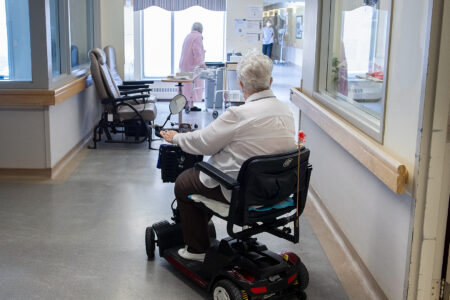
Recently, while listening to CBC’s The Current, I was struck by a heart wrenching question posed by a gentleman to one of the pandemic experts on the show. The man had tested positive for COVID-19, and his most pressing concern was when he could safely see his 96-year-old mother who lives by herself in her community.
Take a moment to imagine that; not only was he dealing with a deadly virus, he was in a state of panic over how his mother would get by without his direct care.
He is but one of a myriad untold stories of family caregivers across the country, stories I have heard in conversations with colleagues and friends.
There’s the adult son who can no longer travel outside his own province to provide respite for other family members caring for his elderly parents. Or the daughter who has to leave the home to self-isolate after coming into contact with someone who has tested positive for the virus, leaving her elderly mother with mobility issues on her own. There is the wife who is unable to bring her husband with Alzheimer’s to the grocery store with her anymore, but can’t leave him home alone for fear of his safety.
Through this pandemic, we are learning more and more about the family and friends looking after older Canadians both in their homes, and greatly supporting the staff caring for our elders within long-term care facilities.
COVID-19 has left a trail of devastation on one of our more vulnerable populations. Elders across the nation, many living in long-term care residences, are getting infected at a much higher rate, and sadly the resulting loss of life is significant, and the impact on our communities vast.
Understandably, much of our attention has been focused on how to address the current crisis of COVID-19 spreading rapidly through our long-term care facilities. However, policy-makers must not lose sight of the valuable caregivers who do the majority of their work outside those long-term residences.
Care in the community
We want, and encourage, older Canadians to remain in their homes for as long as they are able. It helps to maintain personal autonomy, mobility, mental health and connection to community – among other benefits. This continued independence does have a cost, it’s just not at the expense of our public health system; the emotional, mental and financial cost is typically placed on the family and friends who step-up as caregivers.
Latest statistics suggest that there are 7.8 million caregivers. Of Canadians receiving care, 88 percent said they relied on the help of family and friends. Many of these caregivers are adult children, themselves in their 60s and 70s, caring for older parents aged 85 and older. Over half of women and 27 per cent of men aged 85 and older live alone in the community.
While, as noted earlier, the majority of these caregivers work directly with their loved ones in their homes, they also provide significant complementary support services in residential settings, when the difficult decision to make the transition is made. These services include tidying up, helping with feeding, emotional support, and socialization. Perhaps most importantly, they serve as the resident’s advocate, performing their own regulatory oversight of the quality of care in our nursing homes across the country.
With access to long-term residences denied for these caregivers during the time of COVID, we are fully appreciating the significant role they play in supporting overworked care aides. What has been almost unbearable to think or speak of is the inability for these caregivers to be present as a resident is dying of COVID. This goes to the very heart of what we consider important at end of life.
What has become very clear is that in the midst of its destruction, COVID-19 has pulled back the curtains to expose the reality of how low we prioritize our Canadian elders, and the unacknowledged dependency we have on the family and friends who serve as caregivers.
Both groups need our help, and they need our help now.
A collective call to action
There are tangible actions we can put in motion immediately.
Government can provide more funding to organizations such as provincial and territorial caregivers’ associations offering community services to caregivers – through education, advocacy, research and direct outreach. British Columbia has recently done just that, announcing they will be providing $500,000 for the Family Caregivers of British Columbia to allow the charitable organization to extend their virtual tool kit (which allows family caregivers across the province to connect with the organization and each other) and increase the capacity on their help phone line.
Provincial governments can put in place counselling and trauma assistance for those many family members who have lost loved ones and ask them what would have made it easier for them in this era. This type of programming would fall under provincial continuing care programs and mental health services.
The federal government can develop policy to provide more direct funding to caregivers to help them make ends meet. Further, it can make the Canadian Caregiver Credit refundable (in the same style as the Universal Child Benefit) and not only used to lower taxes owing.
The onus cannot just be on government; we all must step up and donate to the organizations who are on the ground, providing direct outreach.
While these are tangible steps we can take in the immediate and mid-term, we know we will be dealing with the aftermath of COVID for the long haul.
The weight these caregivers are carrying will only get heavier due to the demographic shift in family makeup that result from declining fertility rates over time. This shift means the family caregivers we depend on today are going to less numerous in the years ahead.
The provinces and territories should form a committee to develop and execute a strategy to address the needs of family caregivers.
Ultimately, it is up to governments to determine their approach, but the status quo is not an option. We need to take action now to develop supportive family caregiver policies, in our workplaces and our communities. We should support the caregivers who will help the large baby boomer cohort to live in the community for as long as possible. No longer can we fail older Canadians in need of support.
This article is part of the Facing up to Canada’s long-term care policy crisis special feature.
For related content, check out the IRPP’s Faces of Aging research program.









